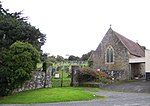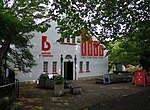Westleigh, North Devon
Civil parishes in DevonDevon geography stubsNorth DevonVillages in Devon

Westleigh is a village and civil parish in the North Devon district, in the English County of Devon. Tapeley Park, a country house, is located within the parish. The village overlooks the Taw and Torridge Estuary.To the South of Westleigh is the hamlet of Southcott.
Excerpt from the Wikipedia article Westleigh, North Devon (License: CC BY-SA 3.0, Authors, Images).Westleigh, North Devon
Atlantic Highway, North Devon Westleigh
Geographical coordinates (GPS) Address Nearby Places Show on map
Geographical coordinates (GPS)
| Latitude | Longitude |
|---|---|
| N 51.03 ° | E -4.18 ° |
Address
Atlantic Highway
EX39 4NJ North Devon, Westleigh
England, United Kingdom
Open on Google Maps










